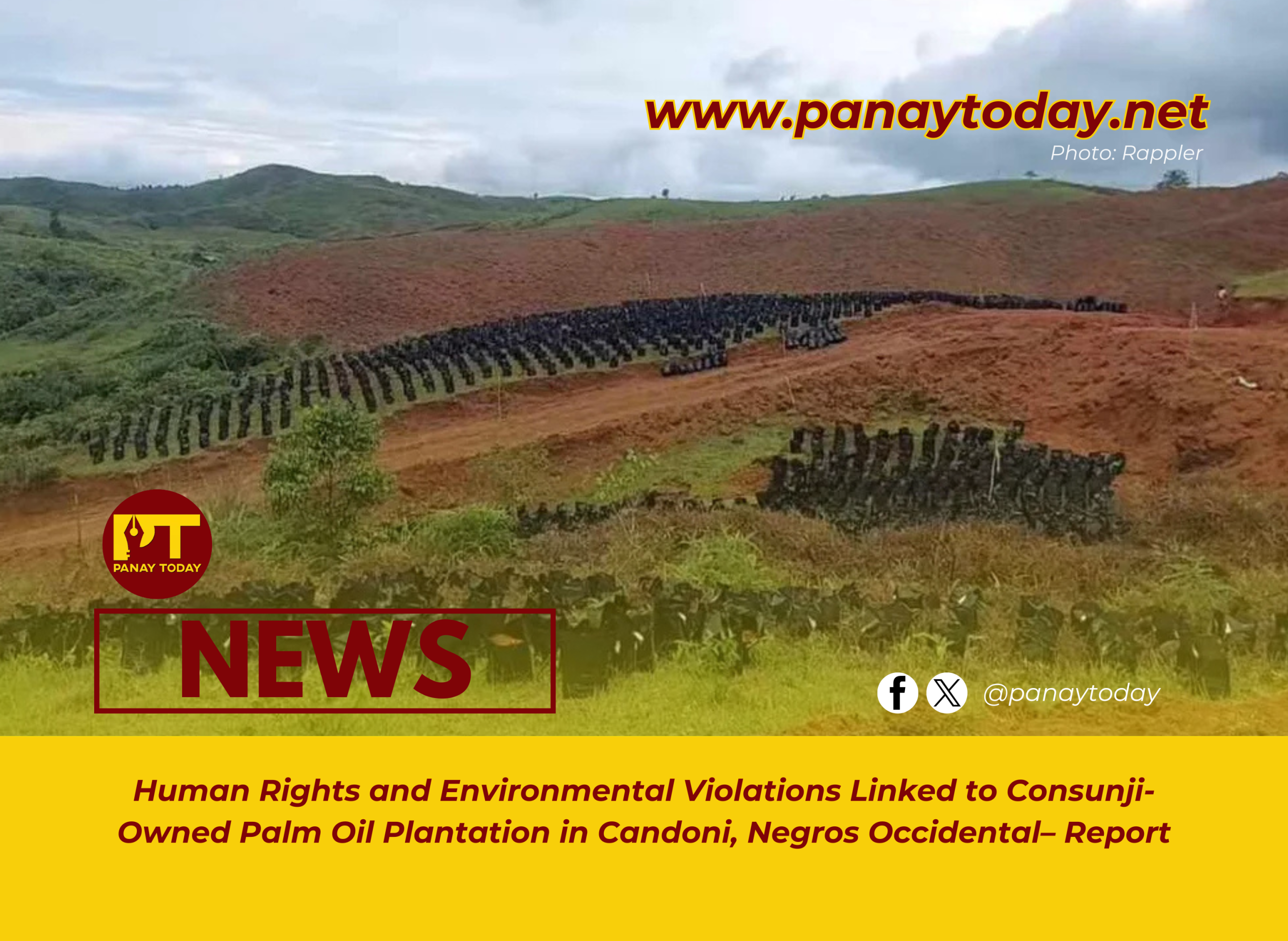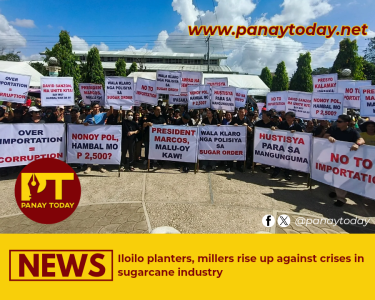By Juliane Judilla
Grave human rights abuses and environmental violations were uncovered by the International Learning and Solidarity Mission (ILSM) during a two-day fact-finding mission in Barangay Gatuslao, Candoni, Negros Occidental, where the construction of a massive palm oil plantation by Hacienda Asia Plantations Inc. (HAPI) is underway.
From October 12 to 13, 2025, delegates from across the Philippines and abroad, including Makabayan President Liza Maza, Rev. Fr. Melvin Fajardo of the Iglesia Filipina Independiente (IFI), Ariel Casilao of Unyon ng mga Manggagawa sa Agrikultura (UMA), Jenny Rapiz of Alyansa nga Magbubukid ng Bulacan, and RJ Ledesma of HAKSON, Inc., visited the site to assess the socioeconomic, labor, and ecological impact of the plantation.
At a press conference held on October 14 in Bacolod City, the delegation presented its preliminary findings, which include reports of labor exploitation, forced displacement, environmental destruction, and harassment from state forces.
Widespread Labor and Human Rights Violations
According to the ILSM report, workers at the HAPI plantation receive as little as ₱480 per day for 12-hour shifts — far below the minimum wage — and are denied basic labor rights and government-mandated benefits such as SSS, PhilHealth, and Pag-IBIG.
“These accounts highlight the systemic exploitation and rights violations faced by workers at the HAPI oil palm plantation. The lack of accountability and deliberate disregard for labor laws not only endangers worker welfare and livelihood but also reflects a deeper pattern of corporate neglect and impunity,” said Ariel Casilao of Unyon ng mga Manggagawa sa Agrikultura (UMA).
Religious leaders and farmers’ advocates joined the call to end what they described as unjust and destructive practices.
“What we have witnessed in our two-day exposure trip in Candoni were clear violations of the integrity of God’s creation. Church people, and all sectors, must unite to end the destructive practices of HAPI,” Rev. Fr. Melvin Fajardo, IFI of ONE-C said.
Rev. Fr. Fajardo recalled how the workers’ situation grew “more desperate.”
He recounted situations where senior workers spend long hours punching 2,500 holes in plastic pots for palm seedlings per day, often enduring the scorching heat of the sun, skipping meals to avoid delays, and are often met with strict quotas that can result in removal and reassignment. There is also an instance where one worker lost his finger while riding a tractor and was not offered any medical aid, only a P5,000– barely enough for medicine and transport.
“This cruelty reveals a pattern of neglect and impunity that can no longer be tolerated,” he said.
“The Scripture remind us: ‘The laborer deserves his wages.’ Yet in Negros, the laborer is denied even the right to live decently.” Fr. Fajardo added.
Local farmers also reported intimidation and coercion by HAPI’s community relations officers, especially when they refused to sell or vacate their land. Incidents of drone surveillance, bulldozing of crops, and even indiscriminate firing by military forces were brought to light, raising alarm over the militarization of the area.
“HAPI, Inc is destroying the livelihoods of these farmers. From bulldozing their crops to military harassment, the farmers and IPs’ land rights are not being respected. We commend the locals for trying to organize amid the militarization of their community and we must support their calls to expel HAPI, Inc from Candoni,” said Jenny Rapiz of Alyansa nga Magbubukid ng Bulacan.
Ecological Devastation and Illegal Operations
The ILSM team documented severe environmental degradation in the area due to the large-scale development, including massive tree cutting, illegal quarrying, and terracing of forest land. This has led to significant soil erosion, the destruction of wildlife habitats, and increased risks of landslides.
The site, which spans over 6,000 hectares, is operating without an Environmental Compliance Certificate (ECC), the report revealed.
In June 2025, Negros Occidental Governor Eugenio Lacson and Candoni Mayor Ray Ruiz had called for a suspension of operations due to the environmental risks. However, large-scale activities reportedly continued.
“The damage caused by HAPI, Inc to the environment is irreparable. Even without an ECC, the palm oil plantation has caused significant destruction to the ecological system of the area and has disrupted the current lives and future generations of locals. The over 6,000 hectare palm oil plantation is a prime example of a large-scale project that directly benefits people like the Consunjis and Aranetas in the guise of ‘development’,” said RJ Ledesma, Campaign Officer of HAKSON, Inc.
‘Controversial’ IFMA
In 2009, the Department of Environment and Natural Resources (DENR) granted an Integrated Forest Management Agreement (IFMA) to HAPI, which allowed them to develop the land for palm oil production. The ILSM delegation criticized this agreement, citing that the area is agriculturally productive and home to Indigenous Peoples and long-time local farmers.
Makabayan President Liza Maza questioned the legality of the agreement.
“The call to revoke IFMA by the IPs is just. The DENR shouldn’t have granted the IFMA because the said area is planted with agricultural crops. Ang tanong ko: meron ba nabigyan ng suhol sa DENR ang HAPI? Makabayan will file a house resolution to conduct a congressional inquiry into these violations,” said Maza.
Recommendations
Following their investigation, the ILSM delegation issued a strong call to action, urging the government to immediately revoke HAPI Inc.’s Integrated Forest Management Agreement (IFMA) and halt all its operations in Candoni. They recommended the filing of a Writ of Kalikasan to hold the company accountable for environmental destruction and to mandate the rehabilitation of damaged lands.
The delegation also demanded the pullout of the 15th and 47th Infantry Battalions of the Philippine Army from the area, citing their role in harassment and intimidation of farmers and Indigenous Peoples. They called on the Commission on Human Rights to investigate the reported violations, and for both provincial and municipal governments to issue resolutions opposing the plantation.
Furthermore, they urged Congress to launch a legislative inquiry into the misuse of IFMAs and the Indigenous Peoples Rights Act (IPRA), which they say are being weaponized to displace communities. Finally, the delegation pushed for the immediate passage of the Genuine Agrarian Reform Bill (GARB) as a long-term solution that recognizes the tillers’ right to land, upholds Indigenous rights, and promotes food sovereignty in the country.





